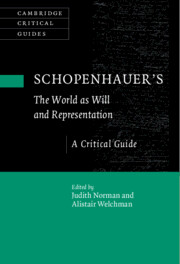Book contents
- Schopenhauer’s The World as Will and Representation
- Cambridge Critical Guides
- Schopenhauer’s The World as Will and Representation
- Copyright page
- Contents
- Contributors
- Acknowledgments
- Note on Texts, Translations, and Abbreviations
- Introduction: Schopenhauer in the Time of Pandemic
- Chapter 1 Different Kinds of Willing in Schopenhauer
- Chapter 2 Resignation
- Chapter 3 Appreciating Nature Aesthetically in The World as Will and Representation: Between Kant and Hegel
- Chapter 4 The Hour of Consecration: Inspiration and Cognition in Schopenhauer’s Genius
- Chapter 5 Experiencing Character as a Key for a Present-Day Interpretation of Schopenhauer
- Chapter 6 Schopenhauer in Dialogue with Fichte and Schelling: Schopenhauer’s Critique of Moral Fatalism and His Turn to Freedom from Willing
- Chapter 7 Schopenhauer’s Philosophy of Religion: (Hopeless) Romanticism?
- Chapter 8 Maja and Nieban in The World as Will and Representation
- Chapter 9 Schopenhauer, Universal Guilt, and Asceticism as the Expression of Universal Compassion
- Chapter 10 Seeing Things: Schopenhauer’s Kant Critique and Direct Realism
- Chapter 11 The Sciences in The World as Will and Representation
- Chapter 12 Pushing Back: Reading The World as Will and Representation as a Woman
- References
- Index
- Cambridge Critical Guides
Chapter 11 - The Sciences in The World as Will and Representation
Published online by Cambridge University Press: 08 December 2022
- Schopenhauer’s The World as Will and Representation
- Cambridge Critical Guides
- Schopenhauer’s The World as Will and Representation
- Copyright page
- Contents
- Contributors
- Acknowledgments
- Note on Texts, Translations, and Abbreviations
- Introduction: Schopenhauer in the Time of Pandemic
- Chapter 1 Different Kinds of Willing in Schopenhauer
- Chapter 2 Resignation
- Chapter 3 Appreciating Nature Aesthetically in The World as Will and Representation: Between Kant and Hegel
- Chapter 4 The Hour of Consecration: Inspiration and Cognition in Schopenhauer’s Genius
- Chapter 5 Experiencing Character as a Key for a Present-Day Interpretation of Schopenhauer
- Chapter 6 Schopenhauer in Dialogue with Fichte and Schelling: Schopenhauer’s Critique of Moral Fatalism and His Turn to Freedom from Willing
- Chapter 7 Schopenhauer’s Philosophy of Religion: (Hopeless) Romanticism?
- Chapter 8 Maja and Nieban in The World as Will and Representation
- Chapter 9 Schopenhauer, Universal Guilt, and Asceticism as the Expression of Universal Compassion
- Chapter 10 Seeing Things: Schopenhauer’s Kant Critique and Direct Realism
- Chapter 11 The Sciences in The World as Will and Representation
- Chapter 12 Pushing Back: Reading The World as Will and Representation as a Woman
- References
- Index
- Cambridge Critical Guides
Summary
Marco Segala argues that the tight seal Schopenhauer wanted to maintain between ordinary experience along with its investigation in the natural sciences on the one hand, and metaphysics on the other, is more porous than Schopenhauer can acknowledge in WWR 1. Segala proposes a rethinking of Schopenhauer’s philosophy of nature, conceiving it less as an “explanation” of science and more as a conceptual space in which metaphysics (Ideas) and science (natural forces) can interact. But ultimately, he argues, Schopenhauer abandoned the Ideas completely as having any role in scientific explanation, supplementing his philosophy of nature with a philosophy of natural science that anticipates modern approaches.
- Type
- Chapter
- Information
- Schopenhauer's 'The World as Will and Representation'A Critical Guide, pp. 224 - 244Publisher: Cambridge University PressPrint publication year: 2022

